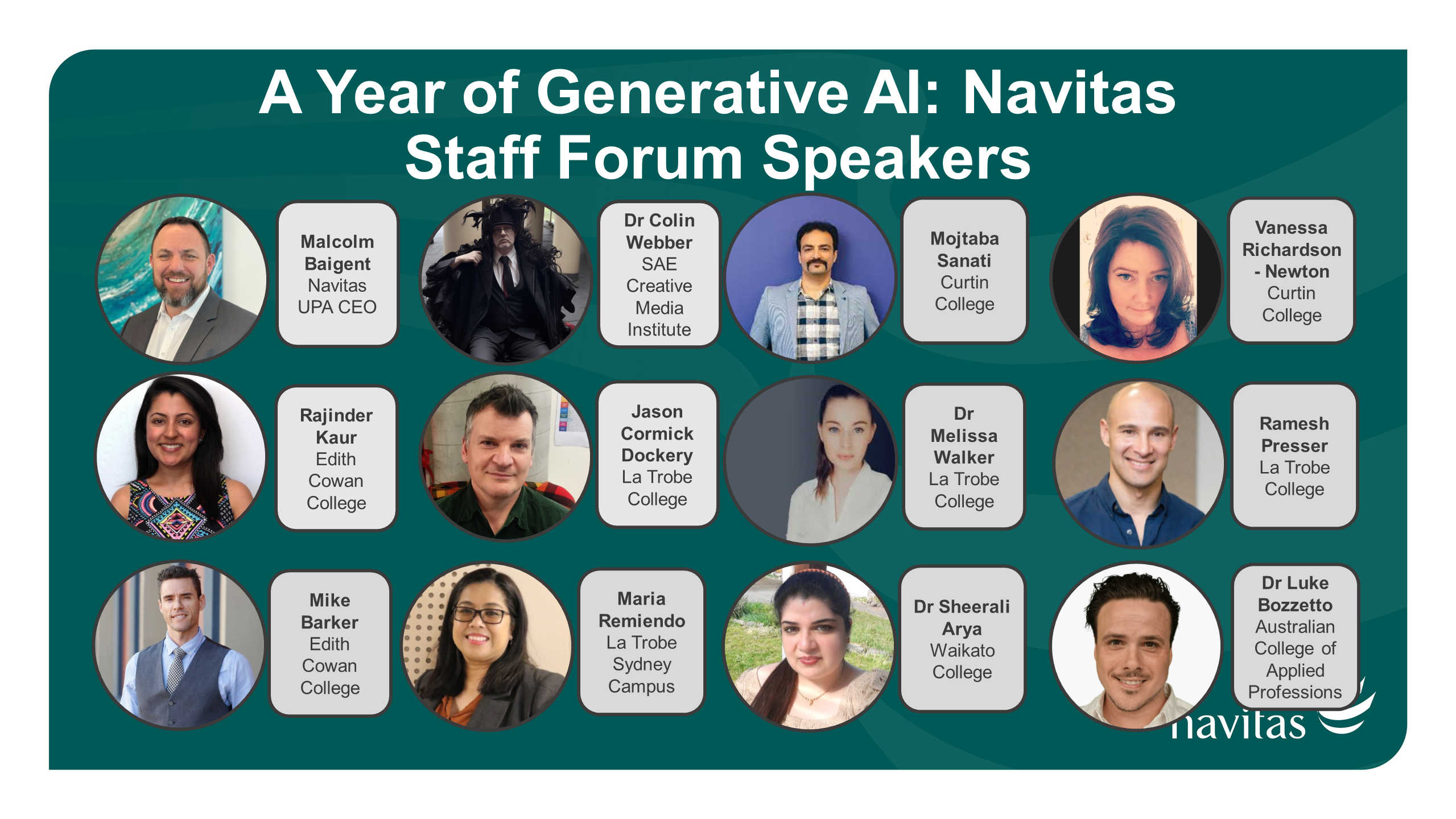Insights from “A Year of Super-Accessible Generative AI in Higher Education: A Navitas Staff Forum”

ChatGPT is officially one year old, and the implications of this suddenly super-accessible technology for teachers, students, and institutions in the higher education sector have been profound.
To reflect upon and share strategies regarding teaching, learning, assessment, and generative AI, Navitas staff from across the globe came together for Learning and Teaching University Partnerships Australasia’s (UPA), “Navitas Staff Forum: A Year of Super-Accessible Generative AI”.
The forum featured diverse representation from across Navitas colleges and divisions, covering a broad range of AI related topics, including the role of AI ethics in business studies, questions of authorship and cognitive outsourcing, the efficacy of AI detectors, and teachers’ responses to AI use and misuse in assessment.
Navitas UPA CEO Malcolm Baigent delivered the forum’s opening address, Reflecting on a year of transformation at Navitas, to approximately 140 Navitas staff members.
He said that generative AI technology had placed students, educators, and institutions on the frontline of the AI discourse, as they sought to navigate and adapt to major changes in teaching, learning, and assessment.
He praised staff for developing innovative ways of integrating AI into curriculum and assessment, delivering student-focused workshops to equip learners with the skills and capabilities needed to navigate AI technologies critically and ethically, attending workshops and webinars to develop their own AI knowledge and capabilities, and sharing their resources, strategies, and challenges with the broader Navitas community.
“In this time of rapid change, Navitas educators have risen to the occasion, addressing the challenges, affordances, and limitations posed by these sophisticated but flawed models. Our educators have grappled with questions of pedagogy, academic integrity, AI literacy, ethics of AI, intellectual property, and privacy, and so much more. You have come together to adopt a collaborative, student centred approach to navigating this challenge,” he said.
“I’ve been so proud to see our Navitas community rise to the challenges of a rapidly evolving educational landscape, as we strive to continue to deliver our purpose of transforming lives through education.”
Seven presentations from UPA academic leaders and educators followed Malcolm Baigent’s opening address, with each presentation exploring how their institution had responded to generative AI and sharing insights and strategies from their practice.

learningandteaching@navitas.comEdith Cowan College (ECC) Program Coordinators and Academic Leaders, Rajinder Kaur and Mike Barker presented, A study of teachers’ initial experiences in response to AI use and misuse in assessments submitted by first-year international students, which highlighted key findings obtained through focus groups in the areas of definition, appropriate use of, detection, and outcomes of AI in assessment.
The presenters said ECC found “a substantial degree of confusion and inconsistencies in all key areas of generative AI, with teaching staff expressing a need for clarification and support in relation to students’ use of AI in assessment.”
The presenters noted the need for clearer direction and guidance for teaching staff regarding students' use of AI in assessments, suggesting modifications to policy and procedures informed by TEQSA, partner universities, Navitas, and evidence-based research.
La Trobe College Australia Student Learning Advisor, Jason Cormick Dockery, Lecturer Dr Melissa Walker, and ELICOS educator, Ramesh Presser, presented, Empowering staff by using group collaboration to problem solve Gen-AI guidelines.
The presentation explored the outcomes of LTCA’s educator-led working group, which found there was a need for students to develop critical thinking skills to use ChatGPT and other generative AI platforms and models effectively and ethically.
The presentation highlighted how the college responded by updating the compulsory Academic Integrity Module to incorporate generative AI, developing student communications explaining the importance of academic integrity in the context of generative AI, delivering student and staff workshops, and developing student-centred learning materials to support the development of students’ AI literacy.
University of Waikato College Dr Sheerali Arya’s presentation AI ethics in business education: a critical examination noted that “The convergence of AI and business ethics is not only an academic necessity but also a moral imperative for the responsible leaders of tomorrow.”
Her presentation sought to critically evaluate the ethical usage of Generative AI in business studies, highlighting “the moral imperative that underpins AI ethics in education, emphasising the necessity of equipping the next generation of business leaders with a robust understanding of the ethical dimensions of AI”.
La Trobe University Sydney Campus, Academic Coordinator, Maria Remiendo dove into one of the more controversial and complex topics of the year, with her presentation, True, false, maybe: the AI writing detection tool dilemma.
Her presentation highlighted how AI detectors to date have fallen short of their promises, and the ease with which students can bamboozle these tools through paraphrasing attacks and clever AI prompt engineering, potentially resulting in detectors providing false negatives on student submitted AI generated assessment tasks.
Australian College of Applied Professions, IT academic, Dr Luke Bozzetto presented Leveraging generative AI for enhanced learning experiences in the Master of Information Technology program at ACAP.
His presentation explored how generative AI significantly improved the efficiency of content creation and led to the creation of interdisciplinary tasks and projects that cater to students' individual goals, while also exploring the role of generative AI in enhancing content delivery, assessment methodologies, and feedback mechanisms.
Curtin College Student Learning Advisor Mojy Sanati and Academic Coordinator Vanessa Richardson-Newton presented Embracing Change: Integrating Generative AI into Educational Practices and Assessment at Curtin College, which explored opportunities in the assessment landscape, which they contended was somewhat overdue. They posited that recent literature from TEQSA’s, Assessment Reform in the Age of Artificial Intelligence could pave the way for educators to redesign assessment that integrates AI into curricula and assessments, rather than shunning it completely.
The presentation examined the implementation of these proposals in the essential academic skills unit, 'Academic Research and Writing' at Curtin College, with the aim of facilitating appropriate AI integration, monitoring, and feedback to minimise academic integrity complications throughout the study period.
Finally, Dean at SAE Creative Media Institute, Dr Colin Webber, explored how assessment and teaching are evolving at SAE in response to generative AI, considering the implications of cognitive outsourcing, authorship, and assessment design, while advocating for a culture of experimentation, access, iterative feedback, and process evaluation with his presentation AI at SAE: Don’t stop, but do it right.
Congratulations to all our presenters! Contact learningandteaching@navitas.com for more information.
